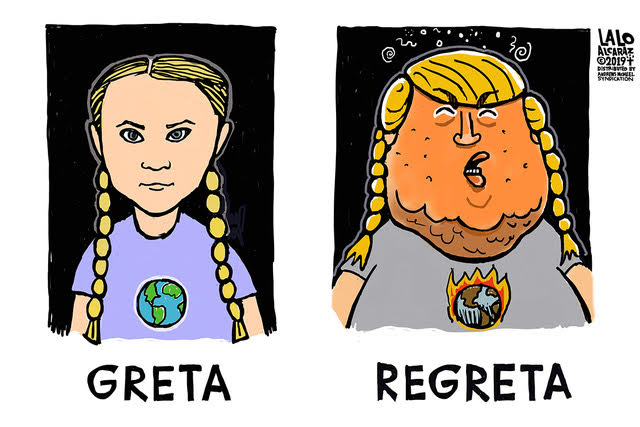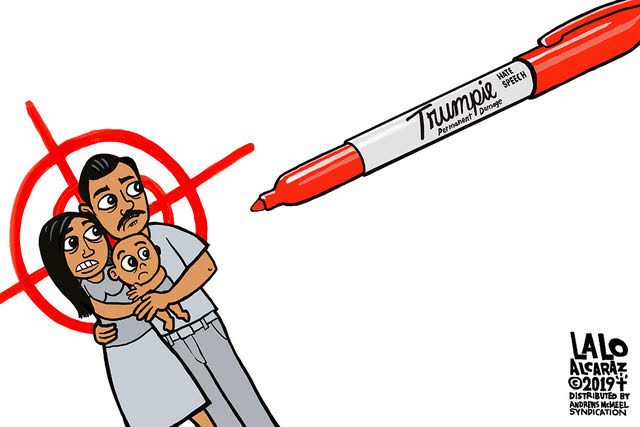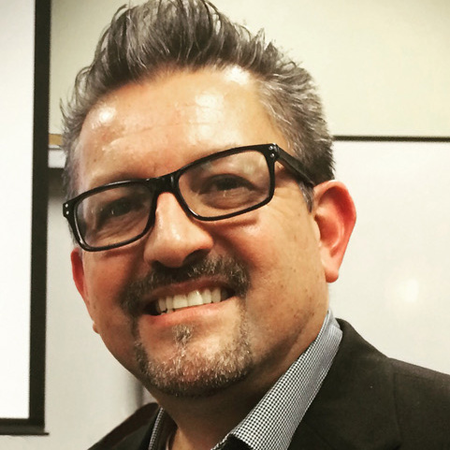October 2019 - Lalo Alcaraz
Lalo Alcaraz
Writer, Producer, and Political Cartoonist
Writer, Producer, and Political Cartoonist
Lalo Alcaraz is probably the most prolific Chicano artist in the nation, according to this bio.
This award-winning joker has spent two decades chronicling the political ascendancy of Latinos in America and pushing the boundaries of Chicano art. He is the creator of the first nationally-syndicated, politically-themed Latino daily comic strip, “La Cucaracha,” he co-founded the political comedy troupe Chicano Secret Service and he co-hosts the infamous “Pocho Hour of Power” on KPFK in Los Angeles (90.7 FM).
Lalo also teaches at Otis College of Art & Design in L.A. Alcaraz recently won the So Cal Press Club Award for Best Editorial Cartoons in 2010. Rumor has it he was actually born here.
Lalo, it’s a great honor to have you for the LXiA membership spotlight. Can you tell us more about yourself, your family upbringing, your beginnings and the path that led you to where you are today?
I was born in San Diego, California, to Mexican immigrant parents. My mom moved to the border (Tijuana) when she was 18, and lived there for a decade. She was undocumented for a while, like many immigrants to the US. She became a nanny and eventually got her papers, and stayed in Southern California. She cleaned houses around San Diego, and my father worked as a landscaper and gardener. As a kid, I’d go along with them to work, and I would garden on the weekends with my dad when I got a little older. Experiencing firsthand how they were mistreated as immigrants sharpened my sense of injustice, and made me the usually furious political cartoonist I am today.
You are well-known in the animation community, but also a well-known activist. Can you talk to us more about the story behind La Cucaracha?
La Cucaracha got its original start in the LA Weekly back in 1992, as a weekly panel, just 6 weeks after the LA Riots rocked Los Angeles, and it evolved into a daily comic strip, which became nationally syndicated in 2002. It covered immigration and other political topics, including cultural critiques of the Latino community, lack of representation of brown people in the media, and Chicano/Latino identity. My editorial cartoons were nationally syndicated around 2000; both features were through Universal Press Syndicate, home of Doonesbury, Calvin & Hobbes, Cathy and The Boondocks. (UPS is now known as Andrews McMeel Syndication.) You can see my work daily in the Los Angeles Times, and online at GoComics.com/lacucaracha and GoComics.com/laloalcaraz. La Cucaracha is about two friends, Eddie and Cuco. One is a chill dude who just wants to watch his favorite shows and have a beer, and his roomie is an anthropomorphic cucaracha, who is a wound up activist who is always correcting everybody’s problematic opinions. I am both of these knuckleheads.

Cartoonist, producer, writer, consultant, teacher, and performer. It goes without saying that you are someone who wears multiple hats at any given time. What is it that fuels your creative energy to pursue everything you do?
I just want more representation of Chicanos/Mexican Americans, Latinos in the media, and I want it done right. Also, I’m pretty restless and impatient, so that’s why putting out a lot of work suits me. But our image is super important, we need to see our faces, our stories out there, as information counters ignorance, and racism is pure ignorance. This is more important than ever in this anti-minority atmosphere fueled by politics of the right.
In talking about representation, we are curious about your role as a consultant and telling a story that can appeal universally as well. What are some of the biggest challenges faced when trying to create a world that shows cultural authenticity, but at the same time appeals to the masses?
Like I say, specificity is universality. The more honest and authentic a story is, the more human and real it feels for viewers. The days of watering down cultural content are over. Audiences want to see real things, and even cartoons and fantasy can be grounded in reality. The more authenticity you can bake into a project the better and more realized it will be–I fully believe that. But I also have to keep in mind that television and film are collaborative arts, and I think the reason I’m doing what I’m doing at this point in my career is because the universe is trying to teach me a lesson in cooperation. I need to play well with others!
“We need more people in the industry that are not only proud of being from a Latino background, but we need those people to actually act on that– i.e. mentor and hire other Latinos.”
There is Lalo Alcaraz the creator, but there is also Lalo the voice in the Latino community that uses his artistic talent to communicate his thoughts. Can you talk to us more about your present hopes for creatives such as yourself and the push for change and representation in the industry?
We need more people in the industry that are not only proud of being from a Latino background, but we need those people to actually act on that– i.e. mentor and hire other Latinos. We need likeminded allies in the industry who know we are only trying to do the right thing, and to help us help them staff a fully realized, diverse workforce in a VERY important industry, one of making images and memories that will live on forever. We are all too talented to not care about our communities, and to just be in the industry to collect a paycheck. There’s more to life than that.

We are super excited for the highly anticipated spin-off of Nickelodeon’s The Loud House called The Casagrandes airing in October of 2019. How did this opportunity happen for you and can your tell us about your role and what you hope this show will accomplish?
I am Consulting Producer, and Cultural Consultant, and a freelance writer for the series. I hope it will become a cherished part of every kid’s childhood, especially for little brown kids. Seeing myself on the screen was something I didn’t get in my childhood, so this is how I can make up for that in my life. I want girls and boys to not only see themselves and their families in the show’s characters, but also I want the broader audience to see a lovable, quirky and authentic Mexican-American familia and to think of Latino people in the same way. We are lovable and quirky! We are friends, neighbors and familia. And believe it or not, some of us are pretty normal.
What is next for Lalo Alcaraz?
We are gonna keep going season after season on The Casagrandes, that’s what! Also I’m in the process of starting a company that will help me get my crazy ideas out to a bigger and bigger audience. And I’m starting to work on a new raft of books, so stay tooned!
Thank you for interviewing with us, Lalo!
Follow Lalo Alcaraz on social media!

